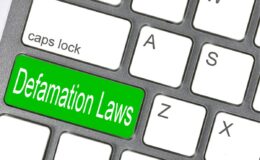Florida Statute Criminalizes School Shooting & Bombing Threats – How Does Law Enforcement Locate People Who Post Online Threats? (O.P-G. v. Florida)
- By : Cbh
- Category : 1st Amendment, Social Media

Two days after the Parkland School shooting in Broward County, a middle school student twenty miles away in Miami Lakes, Florida decided to post on YouTube the following:
“I[’]m going to shoot my school in [F]lorida[.] [I’]m only 13[.]
I got bull[ied] and [I’]m getting my revenge with my guns[.]
[T]he school is [M]iami [L]akes [M]iddle [S]chool.”
Florida has a statute, F.S. 877.13, which makes it unlawful for a person to “knowingly disrupt or interfere with the lawful administration or functions of any educational institution… or activity on school board property…”
In the case of O.P-G. v Florida, the minor defendant was accused of violating the statute, lost at trial, and raised First Amendment objections to the statute.
How Did Authorities Find the Student?
Finding the origin of an internet post, particularly when law enforcement is involved, is a multi-step but fairly clear process. Here, the post was on YouTube, which is owned by Google. Law enforcement made an “exigent circumstances” request to Google to uncover the IP address and other information about the origin of the YouTube post. It is not entirely clear how long it took but Google apparently was fairly swift in returning that information.
Once law enforcement has the IP address, they can easily determine the internet service provider which was used by the person who posted the message. This is pretty simple. In fact, you can do that yourself without any special steps. Just enter an IP address into, say, this search page.
At this point, law enforcement then sent a request to the ISP (in this case, Comcast) for account information which was using or was assigned that particular IP address at the time the YouTube post was made. From the opinion:
“Thereafter, Comcast furnished the address of the subscriber at the time of the posting. A search of a student database revealed that O.P-G., a resident at the address, was enrolled as a student at Miami Lakes Middle School.”
According to the opinion, the defendant confessed when confronted.
Can the State Criminalize Speech Made Off-Campus?
Yes. Let’s parse the statute again which makes it unlawful for a person to:
“knowingly disrupt or interfere with the lawful administration or functions of any educational institution… or activity on school board property…”
The challenge was that the statute did not control off-campus speech, was void for vagueness, and was overbroad. According to the opinion, and some precedent, the language of the statute is unambiguous.
Relative to whether it controlled off-campus speech, the court held, “[h]ere, although section 877.13(1) is limited to the disruption of activities ‘on school board property,’ it does not, by its express terms, insulate conduct that occurs off-campus.”
Relative to any claim of vagueness, the court noted that the statute had a scienter requirement; in other words, the actor had to “knowingly” disrupt or interfere: “Generally, the inclusion of a scienter requirement in a statute mitigates the law’s vagueness…”
Finally, the law was not overbroad because, “… the impact is necessarily measured within the geographic boundaries of the school or school-sponsored event, in accord with the perimeters imposed by Tinker.”
So What Happened to O.P-G.?
Not much. After the finding of guilt, the court “withheld adjudication and imposed a defined term of supervision.”
Because the defendant is a minor, the docket and pleadings are unavailable. You can read this Daily Business Review article.
What’s the Takeaway?
First, there is little anonymity on the internet, especially when the person making the post or sending an email is not using VPN, Tor, or other steps to obscure his or her identity.
Second, law enforcement and schools are going to take online threats seriously, even to the point that they arguably are going to over-react. See the prior case of J.A.W v. Florida and my 2016 article, “Can Your Clients Be Convicted for Threats on Social Media?“
Third, quoting the O.P-G opinion: We further find that “[t]he pervasive and omnipresent nature of the Internet has obfuscated the oncampus/off-campus distinction . . . making any effort to trace First Amendment boundaries along the physical boundaries of a school campus a recipe for serious problems in our public schools.”
Image credit: YouTube


